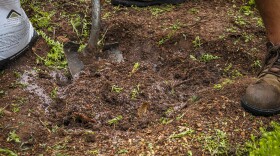The U.S. Department of Agriculture’s Agriculture Research Service of the Southern Plains is on a mission. For 75 years, they’ve been working, “to sustainably balance today’s livelihoods with tomorrow’s needs.” An article from the Amarillo Globe-News reported scientists at the facility do more than write research papers, they put them into practice.
A typical day’s activities could include anything from weighing a 40 ton chunk of soil for moisture content to developing a system that can measure water content in land from space. Wheat strains are bred to use less water and produce more grain.
If you’re wondering if all these experiments have any practical impact on agriculture, a quick look back at wheat yields tells the tale. Dr. Jackie Rudd has developed some of the most popular seed varieties in the state. Rudd said the average Texas wheat yield in 1930 was 11 bushels per acre, in 2013 the average was 32. The yield increase translates to 2.6 billion more loaves of bread on the table.
Note: Rick Todd is a scientist at the Research Center, and is a member of the HPPR Community Advisory Council.







